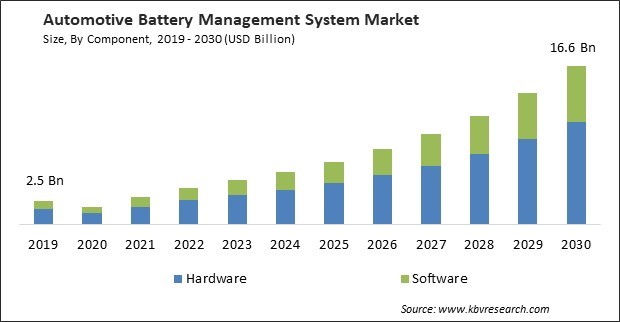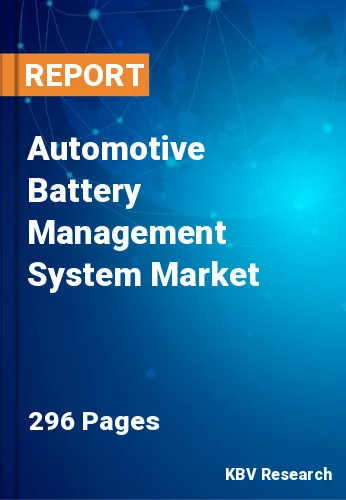The Global Automotive Battery Management System Market size is expected to reach $16.6 billion by 2030, rising at a market growth of 19.8% CAGR during the forecast period.
Continuous advancements in battery technology, particularly lithium-ion batteries, have improved energy density, faster charging, and longer battery life. Consequently, the lithium-ion segment would generate approximately 52.96% share of the market by 2030. BMS technology is indispensable in electric vehicles. Lithium-ion batteries offer an impressive combination of energy density and power, allowing for extended driving ranges and efficient energy utilization, which is critical in the rapidly growing electric vehicle (EV) segment. Additionally, their adaptability to various vehicle sizes and types, from compact cars to large SUVs, positions them as a versatile and scalable solution, cementing their status as the go-to choose for automakers striving to meet the evolving demands of the Automotive BMS market.

The major strategies followed by the market participants are Partnerships, Collaborations & Agreements as the key developmental strategy to keep pace with the changing demands of end users. For instance, In August, 2023, Leclanché SA entered into partnership with Medha Group, a renowned provider of vehicle traction systems and associated electronics in Hyderabad, India. Within this partnership, Leclanché SA will supply its Li-ion battery pack solutions, including the INT-53 and INT-39 high-energy battery packs, to Medha for various projects involving railway auxiliary and maintenance vehicles. Additionally, In February, 2023, LG Energy Solutions joined forces with Freudenberg SE, a global supplier, manufacturer, and service partner for the automotive and general industry sectors. The partnership involves a multiyear agreement for the provision of lithium-ion battery cell modules. This collaboration enhances capacity and supply reliability for these vital markets.
Based on the Analysis presented in the KBV Cardinal matrix; Toshiba Corporation and LG Energy Solutions are the forerunners in the Automotive Battery Managment System Market. In October, 2023, LG Energy Solution and Toyota North America, a division of Toyota Corporation responsible for U.S. vehicle sales, marketing, and distribution, have entered into a supply agreement. This collaboration entails the provision of lithium-ion battery modules by LG Energy Solution for Toyota's U.S.-assembled battery electric vehicles. Companies such as Sensata Technologies Holdings PLC., Futavis Gmbh, Leclanché S.A. are some of the key innovators in the Market.

Innovations in battery chemistry, such as developing solid-state batteries and new lithium-ion variants, offer higher energy density, faster charging capabilities, and longer cycle life. BMS systems are adapting to manage and optimize these advanced battery chemistries. AI and machine learning are integrated into BMS technology to enable predictive maintenance, real-time diagnostics, and intelligent energy management. These innovations improve the accuracy of battery performance prediction and enhance safety. As BMS technology advances, it will play a pivotal role in electrifying vehicles and integrating energy storage solutions, expanding the market.
BMS technology is essential for managing the energy stored in the battery pack efficiently. This optimization allows for increased range as it ensures that energy is used effectively, reducing energy wastage and maximizing the driving distance on a single charge. Regenerative braking and energy recapture systems are vital components of improving EV performance. BMS technology helps control and manage the recapturing and storing energy during braking, further extending the vehicle's range. BMS systems monitor the state of charge (SoC) of the battery in real time. BMS technology provides real-time data and feedback to drivers, helping them make informed decisions about driving habits and route planning to maximize range. The above factors will drive market growth.
Various battery chemistries, including lithium-ion phosphate (LiFePO4), lithium-cobalt oxide (LiCoO2), lithium-manganese oxide (LiMn2O4), solid-state, and others, require tailored BMS strategies. Each chemistry has different voltage, temperature, and aging characteristics, making BMS design more intricate. Different battery chemistries have distinct voltage ranges and charge/discharge characteristics. BMS systems must be capable of managing these variations, ensuring safe and efficient operation. Battery technologies have varying thermal requirements. Ensuring robust cybersecurity measures is critical to protect against external threats that could compromise BMS performance and safety. The above factors will hamper the market growth.

The leading players in the market are competing with diverse innovative offerings to remain competitive in the market. The above illustration shows the percentage of revenue shared by some of the leading companies in the market. The leading players of the market are adopting various strategies in order to cater demand coming from the different industries. The key developmental strategies in the market are Partnerships, Collaborations & Agreements.
On the basis of application, the market is segmented into passenger vehicles, commercial vehicles, and others. The commercial vehicles segment acquired a substantial revenue share in the market in 2022. The commercial vehicles segment primarily includes electric buses and electric trucks. In recent years, there has been a rise in the adoption of electric transportation. The economies worldwide have set their goals for net zero emissions, and countries worldwide are shifting to electric vehicles. One of the most important modes of urban commercial transportation worldwide is buses. Private enterprises, public authorities, and non-profit organizations increasingly utilize electric buses and carriages. In the coming years, the penetration of commercial vehicles is predicted to rise owing to the net zero emissions goals.
Based on topology, the market is classified into modular, centralized, and distributed. In 2022, the modular segment generated the highest revenue share in the system market. Modular BMS designs allow for easy scalability. Additional modules can be added or removed to accommodate different battery pack sizes, chemistries, or configurations. This flexibility is especially beneficial in the EV market, where various vehicle models may require different battery sizes. Redundancy can be achieved through modular topology by having backup modules in place. In case of a module failure, a redundant module can take over to ensure continuous monitoring and management of the battery. The modular approach simplifies the integration of BMS components into a vehicle's architecture. Each module can have well-defined interfaces, making it easier to connect and communicate with other vehicle systems.

On the basis of components, the market is segmented into hardware and software. The software segment acquired a substantial revenue share in the market. The software component ensures the efficient and safe operation of battery packs in electric vehicles (EVs), hybrid vehicles, and other applications. BMS software is responsible for collecting, analyzing, and interpreting data from various sensors and hardware components, making real-time decisions, and providing information to vehicle operators and manufacturers. The software component in the market is integral in optimizing the performance, safety, and longevity of battery packs.
By battery type, the market is categorized into lithium-ion, lead-acid, and others. In 2022, the lithium-ion segment registered the largest revenue share in the market. Lithium-ion batteries are the standard choice for electric vehicles due to their exceptional energy density, power-to-weight ratio, and minimal self-discharge. However, ensuring their safety and durability requires precise oversight for the efficiency and security of the battery and the vehicle; hence, BMS plays a crucial role in the assembly of the automotive battery. BMS is indispensable for overseeing and controlling Li-ion battery performance in EVs, encompassing battery health, charge status, voltage, current, and environmental temperature. Therefore, a BMS is an essential enabling factor for the evolution of lithium-ion batteries.
| Report Attribute | Details |
|---|---|
| Market size value in 2022 | USD 3.9 Billion |
| Market size forecast in 2030 | USD 16.6 Billion |
| Base Year | 2022 |
| Historical Period | 2019 to 2021 |
| Forecast Period | 2023 to 2030 |
| Revenue Growth Rate | CAGR of 19.8% from 2023 to 2030 |
| Number of Pages | 296 |
| Number of Table | 433 |
| Report coverage | Market Trends, Revenue Estimation and Forecast, Segmentation Analysis, Regional and Country Breakdown, Competitive Landscape, Market Share Analysis, Porter’s 5 Forces Analysis, Company Profiling, Companies Strategic Developments, SWOT Analysis, Winning Imperatives |
| Segments covered | Component, Battery Type, Topology, Application, Region |
| Country scope |
|
| Companies Included | Eberspächer Gruppe GmbH & Co. KG, Sensata Technologies Holding PLC, AVL List Gmbh, LG Energy Solution Ltd., Ficosa International S.A, Leclanché S.A, Nuvation Energy (Nuvation Research Corporation), Futavis Gmbh (Deutz AG), Toshiba Corporation, Elithion, Inc. |
| Growth Drivers |
|
| Restraints |
|
Region-wise, the market is analysed across North America, Europe, Asia Pacific, and LAMEA. The Europe region garnered a significant revenue share in the market in 2022. The emerging electric vehicle sector positively impacts the region's manufacturing of lithium-ion battery cells/packs and related components such as BMS. Europe also has a significant presence of automobile manufacturers. With the rising trend of e-mobility, a massive need for electric vehicle batteries in the region has been created. These factors drive the growth of the market in this region. Furthermore, the demand for automotive BMSs in this region is due to the presence of manufacturing aptitudes of major automotive manufacturers.
Free Valuable Insights: Global Automotive Battery Management System Market size to reach USD 16.6 Billion by 2030
The market research report covers the analysis of key stakeholders of the market. Key companies profiled in the report include Eberspächer Gruppe GmbH & Co. KG, Sensata Technologies Holding PLC, AVL List Gmbh, LG Energy Solution Ltd., Ficosa International S.A, Leclanché S.A, Nuvation Energy (Nuvation Research Corporation), Futavis Gmbh (Deutz AG), Toshiba Corporation, Elithion, Inc.
By Component
By Battery Type
By Application
By Topology
By Geography
This Market size is expected to reach $16.6 billion by 2030.
Expansion of technological innovations are driving the Market in coming years, however, Complexity of various battery techniques restraints the growth of the Market.
Eberspächer Gruppe GmbH & Co. KG, Sensata Technologies Holding PLC, AVL List Gmbh, LG Energy Solution Ltd., Ficosa International S.A, Leclanché S.A, Nuvation Energy (Nuvation Research Corporation), Futavis Gmbh (Deutz AG), Toshiba Corporation, Elithion, Inc.
The expected CAGR of this Market is 19.8% from 2023 to 2030.
The Passenger Vehicles segment is leading the Market by Application in 2022 there by, achieving a market value of $10 billion by 2030.
The Asia Pacific region dominated the Market by Region in 2022 and would continue to be a dominant market till 2030; thereby, achieving a market value of $7 billion by 2030.
Our team of dedicated experts can provide you with attractive expansion opportunities for your business.

